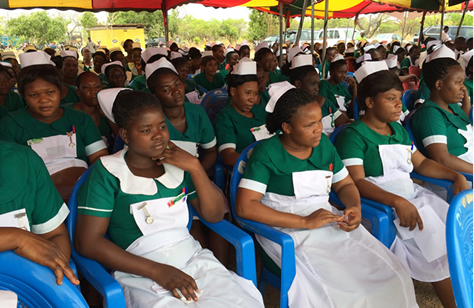Endoscopy nurses need specialized training – Mr Kpodo
 Mr Joel M. Kpodo, Chairman of the Society for Nurses in Endoscopy and Minimally Invasive Surgery- Ghana (SNEMIS), has called for the formalisation of the specialised training for nurses in the fields of gastroenterology, endoscopy (Nurse Endoscopists), and minimally invasive surgery.
Mr Joel M. Kpodo, Chairman of the Society for Nurses in Endoscopy and Minimally Invasive Surgery- Ghana (SNEMIS), has called for the formalisation of the specialised training for nurses in the fields of gastroenterology, endoscopy (Nurse Endoscopists), and minimally invasive surgery.
He said a formal training for nurses would enable them acquire the requisite knowledge, skills, academic and professional qualifications matching international standards.
Mr Kpodo made the call at a three-day third national endoscopy and minimally invasive surgical nursing workshop, ECG reading and basic life support training for nurses and endoscopy staff, held on Friday, in Accra.
The training workshop, on the theme, “Demystifying endoscopy and minimally invasive surgery for safety and efficiency,” entails both didactics and hands-on sessions, which would cover vital areas of the practice, including the roles and responsibilities of the endoscopy nurse, advances in endoscope reprocessing protocols, patient’s pathway in endoscopy, client’s safety in endoscopy, ECG reading and interpretation, and basic life support.
He said endoscopy nursing roles had advanced over the last few years, and today endoscopy nurses were upgrading their skills and qualifications to become nurse endoscopists, bowel scopists, and capsule endoscopy interpreters, lead nurses in therapeutic endoscopy, nurse consultants and Inflammatory Bowel Disease (IBD) specialist nurses.
He noted that the diversity of practice in endoscopy challenges and requires the endoscopy nurse today to acquire the needed academic and professional qualifications, and to continually seek continuing professional developments.
“At the moment, the very few of us advocating for this, have had to go for various degrees of training in foreign countries, from our own pockets, and sometimes supports from some foreign agencies.”
Mr Kpodo said some factors that were affecting the development of endoscopy included, lack of interest and training, lack of exposure, high cost of equipment, cost of procedure, infection control, complications sedation safe handling of equipment among others.
“Lack of government support, insufficient cash flow, lack of equipment in many government hospitals, endoscopy not covered by the national health insurance scheme, little investment in the training of specialists’, high import tariff on equipment and machines, are some of the challenges facing the endoscopy in Ghana.”
He said the ramifications of the roles of the endoscopy nurse were considerable, yet their contribution was often undervalued by colleagues and some managers of some health institutions, saying, it was unsafe and virtually impossible to effectively run any endoscopy service without a well-trained and efficient endoscopy nurse.
“We need to accept that, lots of wrong things have been done over the years to the point that it has become a norm, but all must come on board to tackle the issue with a conscious and deliberate effort to right the wrong.”
Mr Kpodo appealed to the government to work out immediate plans for regulations and accreditation for the numerous endoscopy centres mushrooming as well as the healthcare professionals performing the various procedures.
Dr Kweku Asante Krobea, President, Ghana Registered Nurses and Midwifes Association, said an endoscopy is the procedure that allows qualified health practitioners to view the inside of a person’s body.
He said the universal health coverage and the global goals would not be achieved unless nurses and midwives who make up to 75 percent of the health sector professional workforce globally are supported and empowered to become advanced practitioners.
He said Ghana has had its fair share of the challenges imposed on its heath agenda by the growing global burden of diseases necessitating innovations aimed at the creation of opportunities for health professionals to grow their knowledge.
Dr Asante Krobea said everyday thousands’ of children and adults die needlessly because they do not receive basic life-saving interventions that are often locally available but are simply not provided due to indecision, delays, misdiagnosis and incorrect treatment.
He explained that it is more important to define the field of endoscopy and get it more grinded into the health care practice, urging the nurses in their quest to reverse the trend not to be relentless in their efforts and not to disappoint the good people of Ghana.
SNEMIS – Ghana is a society of nurses in endoscopy and minimally invasive surgery, which was put together to unite as a body engaged in any capacity in the fields of endoscopy or minimally invasive surgical nursing.
It is aimed at advocating for safe and effective practice, advancing the science and practice of endoscopy and minimally invasive surgical nursing through education, training and re-training, research, advocacy, and collaboration.
It is also to promote the professional development of its members in an atmosphere of mutual support, and continually collect information, establish guidelines for future professionals and expand specialized educational opportunities.
Source: GNA
